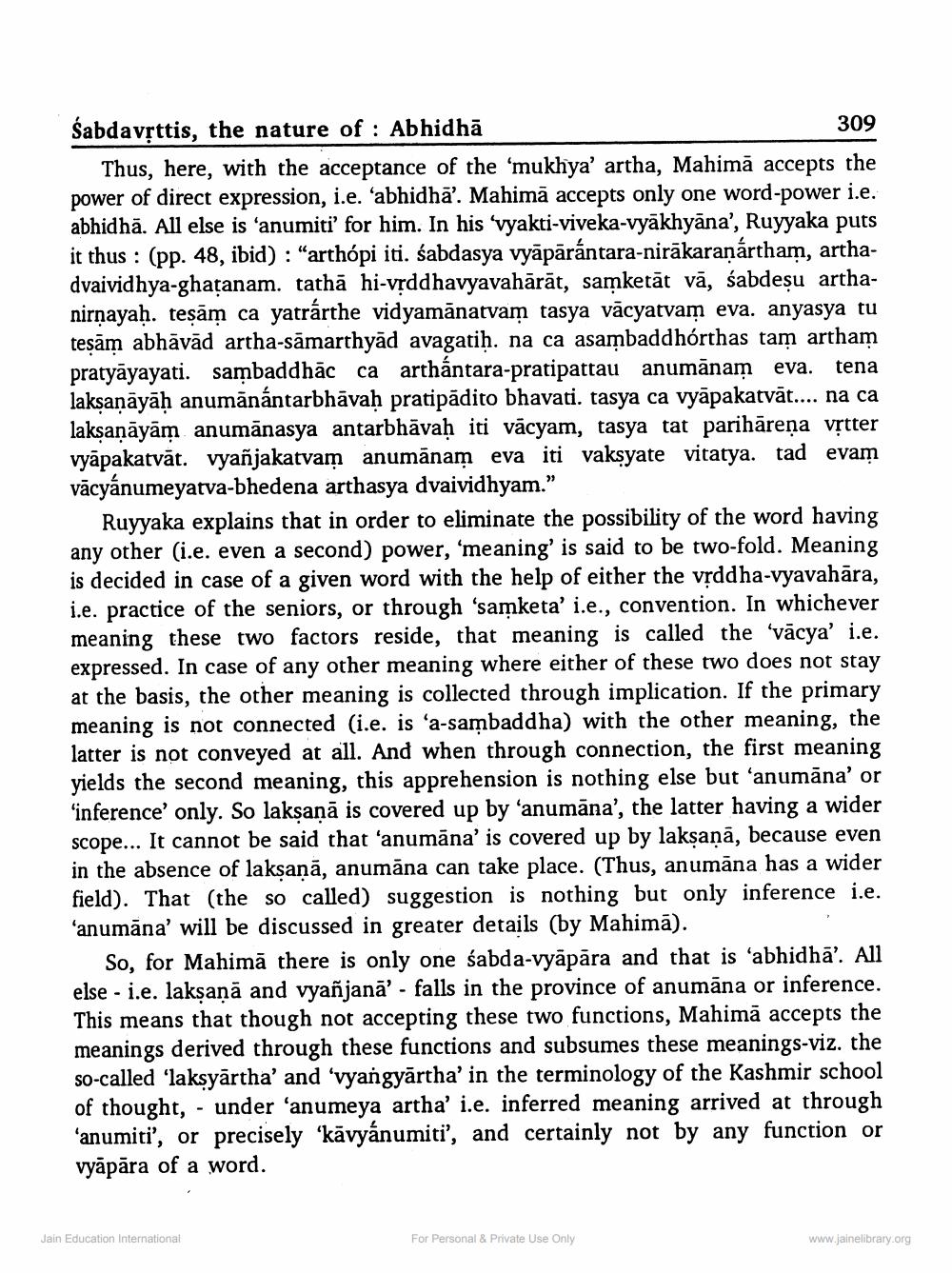________________
Śabdavrttis, the nature of : Abhidhā
309 Thus, here, with the acceptance of the 'mukhya' artha, Mahimā accepts the power of direct expression, i.e. abhidhā'. Mahimā accepts only one word-power i.e. abhidhā. All else is ‘anumiti' for him. In his 'vyakti-viveka-vyākhyāna', Ruyyaka puts it thus : (pp. 48, ibid) : “arthópi iti. śabdasya vyāpārántara-nirākaranártham, arthadvaividhya-ghatanam. tathā hi-vrddhavyavahārāt, samketāt vā, śabdesu arthanirņayaḥ. teşām ca yatrárthe vidyamānatvam tasya vācyatvam eva. anyasya tu teşām abhāvād artha-samarthyād avagatih. na ca asambaddhórthas tam artham pratyāyayati. sambaddhāc ca arthántara-pratipattau anumānam eva. tena laksanāyāh anumānántarbhāvah pratipădito bhavati. tasya ca vyāpakatvāt.... na ca laksanāyām anumānasya antarbhāvah iti vācyam, tasya tat parihāreņa vṛtter vyāpakatvāt. vyañjakatvam anumānam eva iti vaksyate vitatya. tad evam vācyanumeyatva-bhedena arthasya dvaividhyam.”
Ruyyaka explains that in order to eliminate the possibility of the word having any other (i.e. even a second) power, 'meaning' is said to be two-fold. Meaning is decided in case of a given word with the help of either the vřddha-vyavahāra, i.e. practice of the seniors, or through 'samketa' i.e., convention. In whichever meaning these two factors reside, that meaning is called the 'vācya' i.e. expressed. In case of any other meaning where either of these two does not stay at the basis, the other meaning is collected through implication. If the primary meaning is not connected (i.e. is 'a-sambaddha) with the other meaning, the latter is not conveyed at all. And when through connection, the first meaning yields the second meaning, this apprehension is nothing else but ‘anumāna' or 'inference only. So lakṣaṇā is covered up by 'anumāna', the latter having a wider scope... It cannot be said that 'anumāna' is covered up by laksanā, because even in the absence of laksanā, anumāna can take place. (Thus, anumāna has a wider field). That (the so called) suggestion is nothing but only inference i.e. 'anumāna' will be discussed in greater details (by Mahimā).
So, for Mahimā there is only one śabda-vyāpāra and that is ‘abhidhā'. All else - i.e. laksaņā and vyañjana' - falls in the province of anumāna or inference. This means that though not accepting these two functions, Mahimā accepts the meanings derived through these functions and subsumes these meanings-viz. the so-called 'laksyārtha' and 'vyangyārtha' in the terminology of the Kashmir school of thought, - under anumeya artha' i.e. inferred meaning arrived at through
anumiti', or precisely 'kävyánumiti', and certainly not by any function or vyāpāra of a word.
Jain Education International
For Personal & Private Use Only
www.jainelibrary.org




